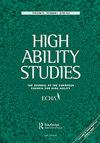寻求帮助作为一种自我调节的学习策略和成就目标:以学业有天赋的青少年为例
IF 1.8
4区 教育学
Q2 EDUCATION, SPECIAL
引用次数: 67
摘要
寻求帮助作为一种重要的自主学习策略,一直与学生的学习动机有关。尽管对成绩优异的学生进行了广泛的研究,但在关于天才儿童的文献中,没有任何研究包括寻求帮助。本研究探讨了通过希腊天才青年中心组织的一项特殊测试过程确定的学业天才青少年(n=207)的求助意图、信念和成就目标动机概况。对学生进行自我报告量表,测量掌握方法、掌握回避、表现方法和表现回避目标、寻求学术帮助的总体意图、寻求工具性帮助的意图、避免寻求帮助以及感知到的寻求帮助的好处和成本。潜在类别分析表明,基于四个目标取向的四个潜在集群是指标变量。在高掌握和低表现目标情景中,学生寻求工具性帮助和感知到的帮助寻求利益的概率较高。成绩目标较高的学生更有可能感知到寻求帮助的成本,而所有目标取向较低的学生则不太可能感知到求助的好处和寻求工具性帮助。研究结果是根据当前的理论和证据进行讨论的,这些理论和证据通常可以实现学生的动机和寻求帮助的信念和倾向。讨论了对天才青少年教育实践的启示。本文章由计算机程序翻译,如有差异,请以英文原文为准。
Help seeking as a self-regulated learning strategy and achievement goals: The case of academically talented adolescents
ABSTRACT Seeking help as an important self-regulated learning strategy has been consistently associated with student motivation. Despite the extensive body of research on typically achieving students, no studies have included help seeking in the literature on talented children. The present study explored the help-seeking intentions and beliefs and achievement goal motivational profiles of academically talented adolescents (n = 207) who were identified via a special testing process organized by the Center of Talented Youth in Greece. Students were administered self-report scales measuring mastery-approach, mastery-avoidance, performance-approach and performance-avoidance goals, general intention to seek academic help, intention to seek instrumental help, avoidance of help seeking, and perceived help-seeking benefits and costs. Latent class analysis indicated four latent clusters based on the four goal orientations as indicator variables. The probabilities of seeking instrumental help and perceived help-seeking benefits were high for students in the high mastery and low performance goals profile. Students in the high performance goals profile were more likely to perceive help-seeking costs, whereas students having all goal orientations low were less likely to perceive help-seeking benefits and to seek instrumental help. Findings are discussed in light of current theory and evidence for typically achieving student motivation and help-seeking beliefs and tendencies. Implications for educational practices with talented adolescents are discussed.
求助全文
通过发布文献求助,成功后即可免费获取论文全文。
去求助
来源期刊

High Ability Studies
Multiple-
CiteScore
4.80
自引率
11.10%
发文量
7
期刊介绍:
High Ability Studies provides a forum for scholars in a variety of disciplines associated with the development of human abilities to their highest level. It is a medium for the promotion of high ability, whether through the communication of scientific research, theory, or the exchange of practical experience and ideas. The contents of this journal are unique in reflecting concerns and recent developments in this area from childhood and across the whole life span in a variety of contexts. Far from being restricted to the traditional focus on high-level cognitive development, it also presents investigations into all other areas of human endeavour, including sport, technology, the arts, business, management and social relations.
 求助内容:
求助内容: 应助结果提醒方式:
应助结果提醒方式:


